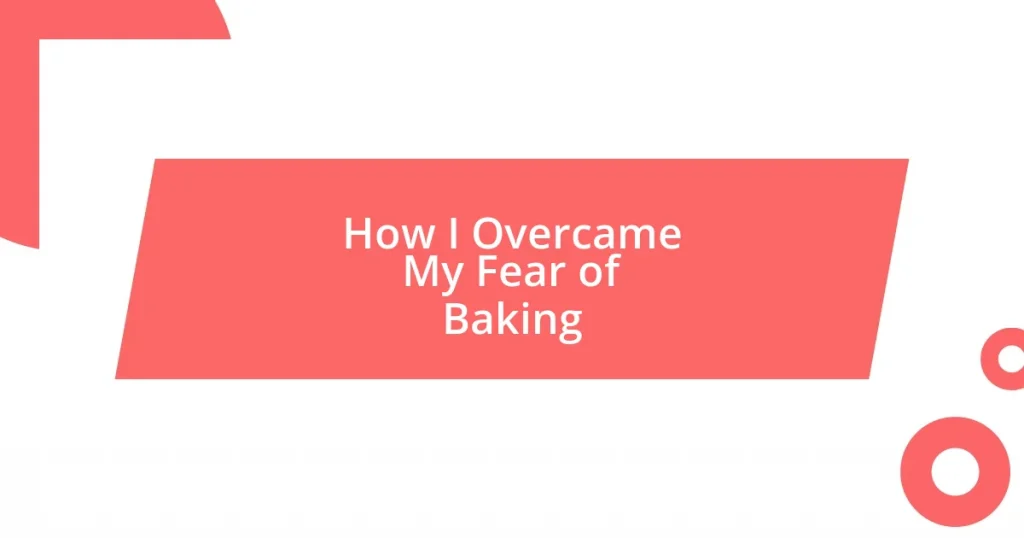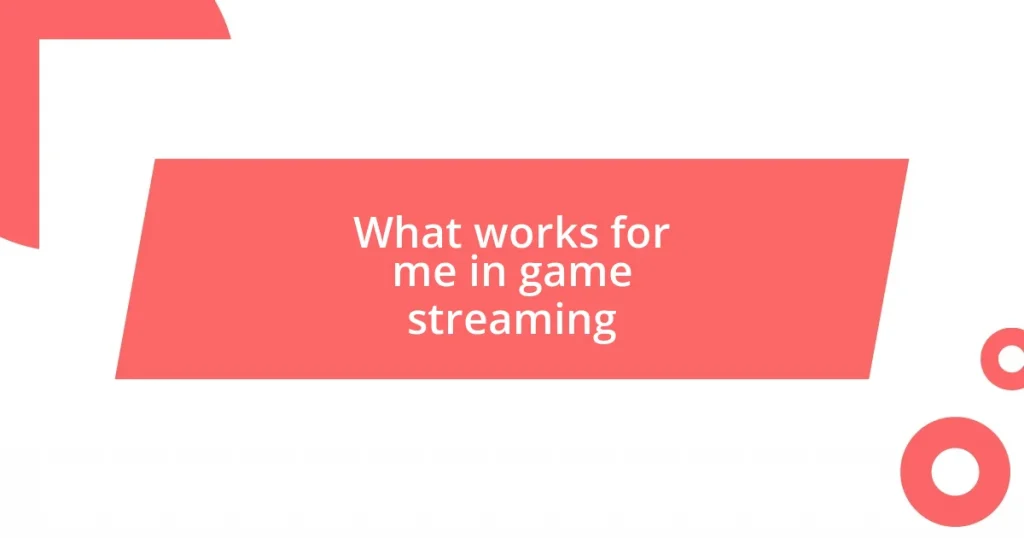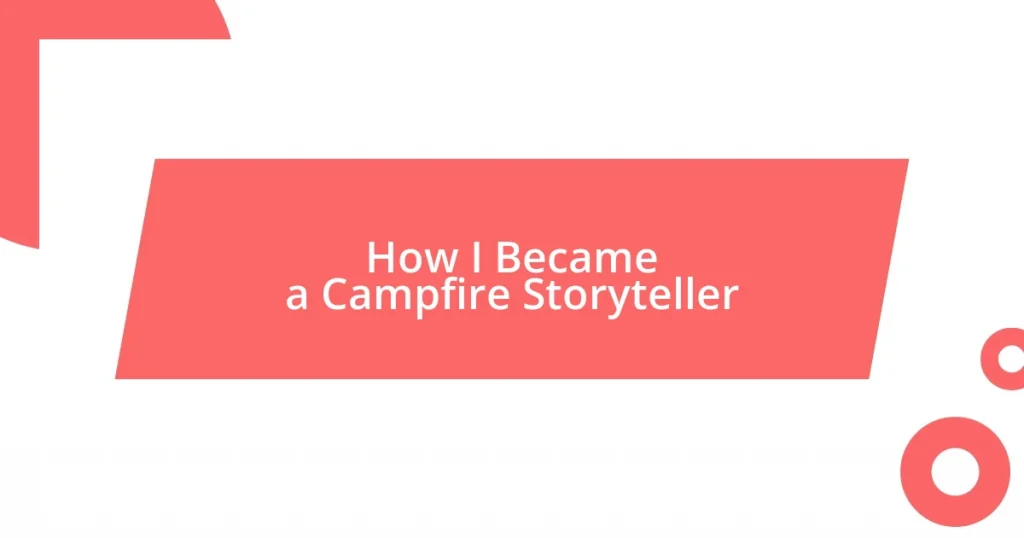Key takeaways:
- Fear of baking often originates from perfectionism, anxiety about failure, and concerns over judgment from others.
- Setting realistic and manageable baking goals, starting with simple recipes, helps build confidence and enjoyment in the process.
- Embracing failures as learning opportunities fosters growth, creativity, and deeper connections through shared experiences in baking.
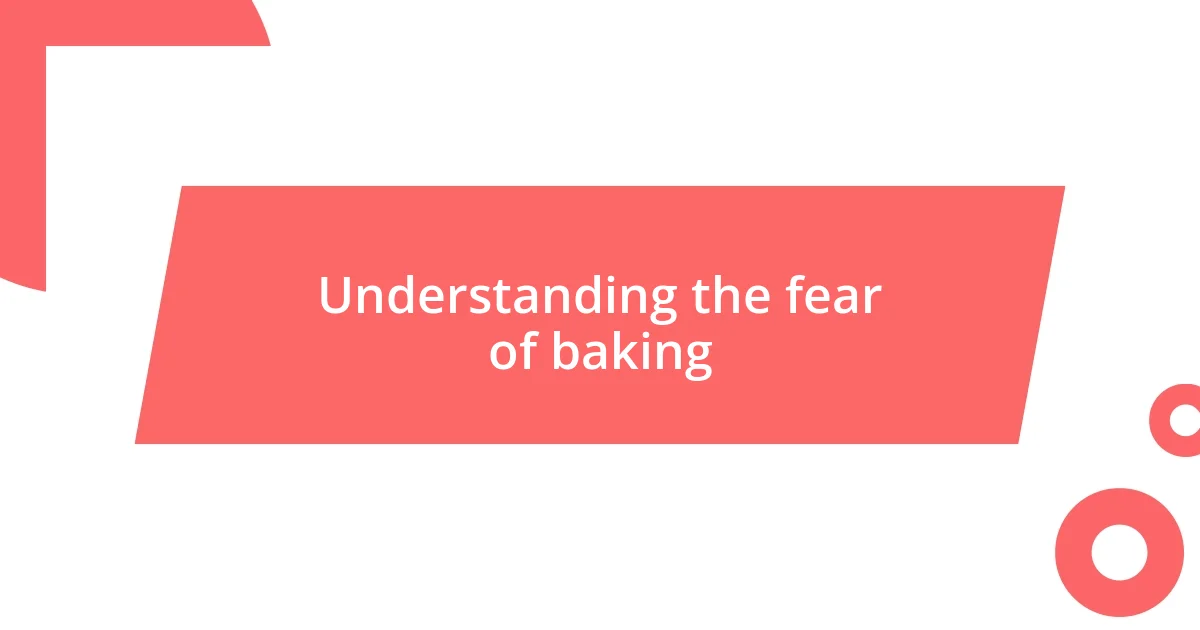
Understanding the fear of baking
Fear of baking often stems from a deep-rooted fear of failure. I remember the first time I attempted to bake a cake; I was overwhelmed by the precise measurements and the daunting list of ingredients. Have you ever stood in front of a recipe, wondering whether you’d be able to replicate the image in your mind, only to be paralyzed by the pressure to succeed?
Another layer to this fear is perfectionism. I’ve often found myself obsessively scrolling through pictures of beautifully frosted cakes, feeling a sense of inadequacy when I compare my efforts to those immaculate creations. It raises the question: why do we set such high standards for ourselves when baking—an activity that’s meant to be enjoyable and fulfilling?
Additionally, the fear of the unknown can play a significant role. The many variables in baking, from oven temperatures to ingredient interactions, create uncertainty. I distinctly recall a time when my bread didn’t rise as expected, and that moment taught me two things: baking is as much about science as it is about art, and it’s okay to embrace the journey, mistakes and all. Isn’t that a comforting thought?
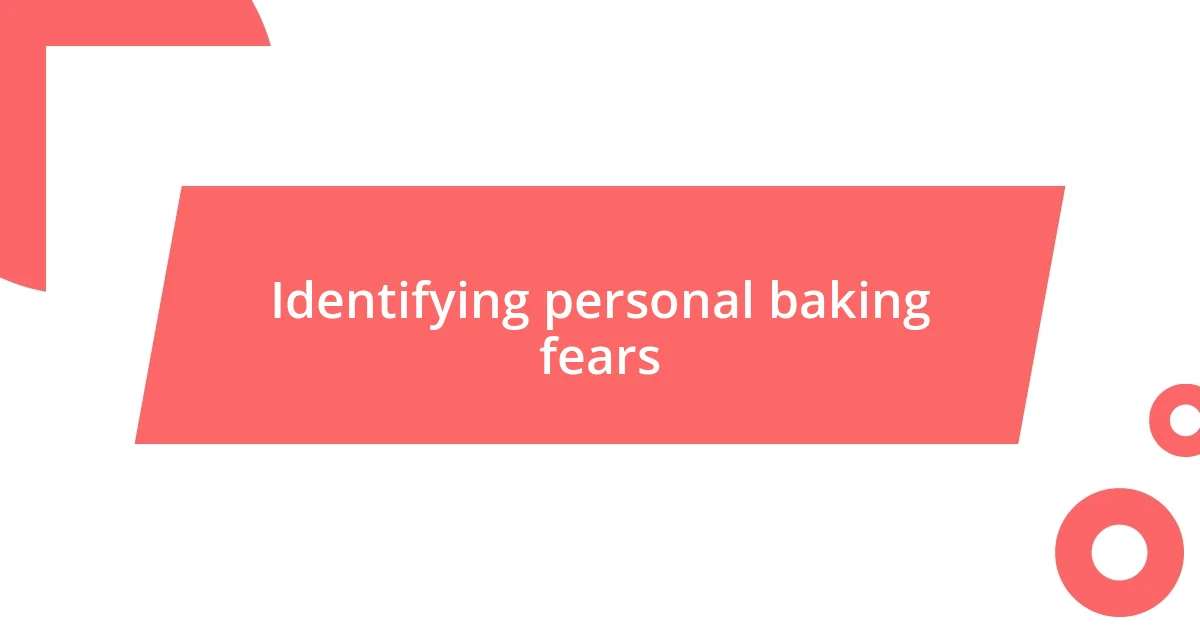
Identifying personal baking fears
Identifying the fears that hold us back from baking can be an enlightening process. For me, one of the most significant fears was the worry about making a mess. I vividly recall my first attempt at making cookies; flour exploded everywhere, and I felt like I had created chaos rather than a delightful treat. It was in that moment that I realized my fear was rooted not just in the baking itself, but in the unpredictability of the task.
Another fear I faced was the concern over timing. I remember anxiously checking the oven every few minutes, convinced that I would ruin my loaf of banana bread if I didn’t monitor it like a hawk. This constant vigilance wasn’t just tiring; it took away from the joy of baking. I had to remind myself that baking is a process, one that deserves patience and allows for a little leeway.
Lastly, the fear of judgment from others loomed large in my mind. I would often think, “What will my friends say if my cake doesn’t taste good?” This fear often prevented me from sharing my creations, which, in hindsight, seems irrational as everyone is on their own baking journey. Learning to embrace imperfections in my baking has truly been liberating, and it’s made me enjoy the process much more.
| Fear | Personal Reflection |
|---|---|
| Making a Mess | I was overwhelmed during my first cookie attempt, turning my kitchen into a floury battlefield! |
| Timing | Constantly checking my banana bread felt exhausting and distracted me from the joy of baking. |
| Judgment | The worry about what others might think held me back from sharing my baking adventures. |
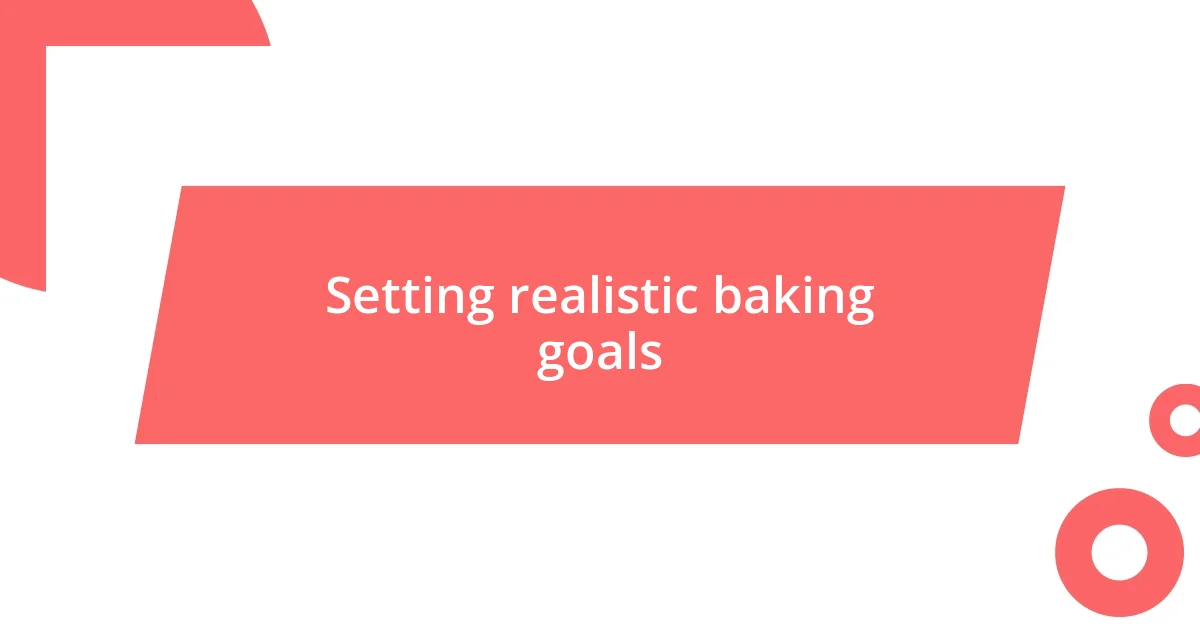
Setting realistic baking goals
Setting realistic goals in baking is crucial for overcoming the pressures that can often paralyze us. When I first started, I decided to tackle my fear by breaking down recipes into manageable steps. For instance, rather than focusing on creating the perfect cake, I set a goal to master a basic sponge first. This shift in perspective made a significant difference for me. Instead of aiming for culinary perfection, I embraced the idea of progress over perfection.
Consider these helpful tips for setting achievable baking goals:
– Start with simple recipes that don’t require specialized skills or equipment.
– Focus on one aspect of baking at a time, like mastering different mixing techniques.
– Celebrate small victories, such as achieving the right texture in your dough.
– Allow yourself room to make mistakes without the fear of failure.
– Gradually increase the complexity of your projects as your confidence builds.
I’ve found that with each completed recipe, no matter how small, I felt more capable and willing to experiment. It was liberating to see baking as a journey rather than a destination. I remember baking a simple batch of muffins, and they turned out deliciously! That moment ignited a spark in me, one that reminded me that every baker has to start somewhere.
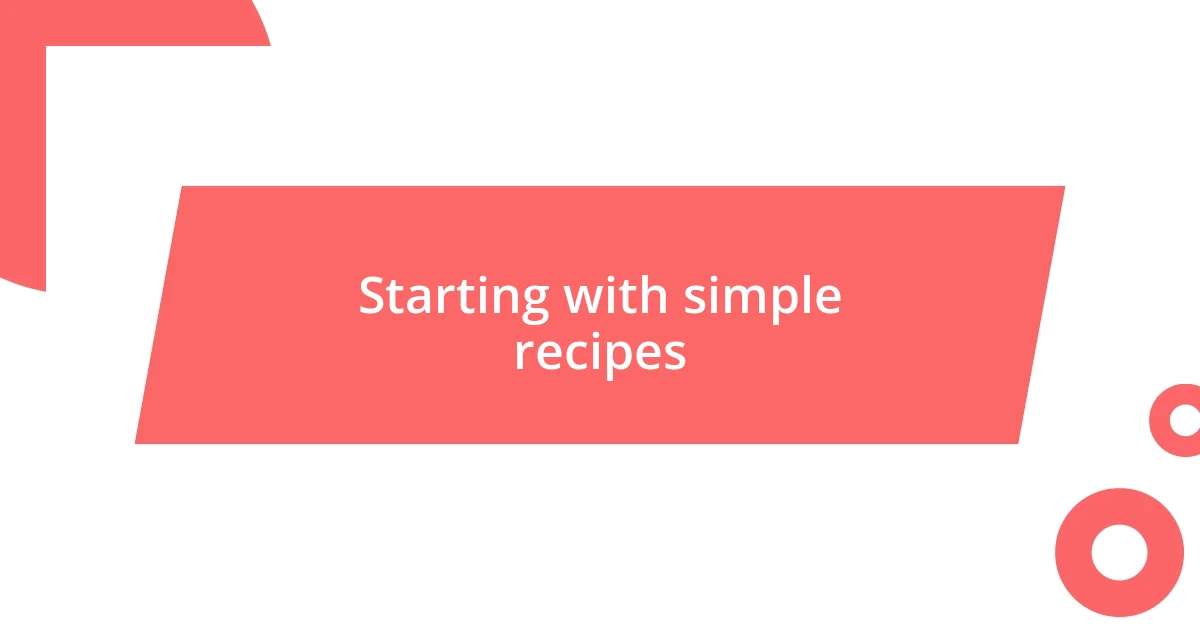
Starting with simple recipes
When I decided to face my baking fears, the first step was choosing simple recipes. I vividly recall whipping up a basic banana bread; it had just a handful of ingredients and didn’t require any fancy techniques. The simplicity was refreshing, and I felt a surge of confidence when I pulled it from the oven, golden and fragrant. Isn’t it amazing how starting small can lead to unexpected joy in the kitchen?
I also learned the value of recipes that were forgiving. For example, making pancakes turned out to be a whimsical experience rather than a strict execution of steps. I think back to the first time I flipped a pancake and it actually landed perfectly in the pan. I felt a rush of accomplishment. It’s a gentle reminder that mistakes can be fun, and sometimes, they lead to the best memories—like that time I made blueberry pancakes and the berries burst, creating a colorful mess that made breakfast way more exciting!
Engaging with simpler recipes not only helped me build my skills but also allowed me to focus on enjoying the process. I often chat with friends about their baking struggles, and I encourage them to try things like no-fail chocolate chip cookies. Can you remember your first time baking cookies? The thrill of melting chocolate and seeing your creation come together? By starting with these kinds of recipes, not only do you find success, but you also uncover the joy that baking can bring to everyday life.
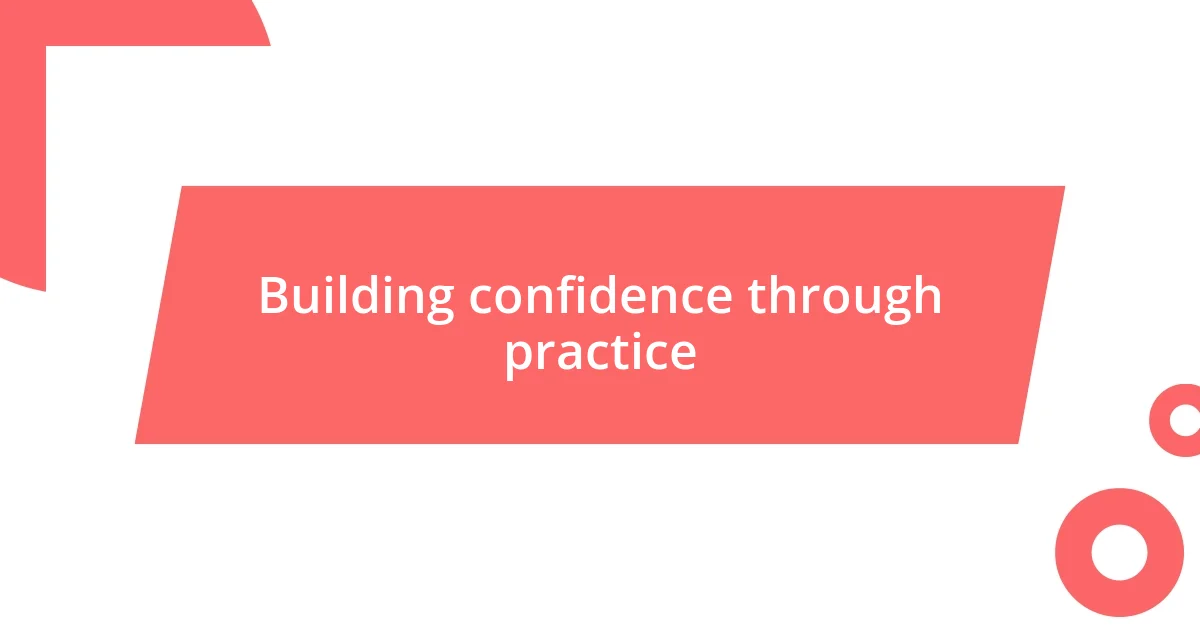
Building confidence through practice
Building confidence in baking truly comes from the repetition of practice. With every time I stepped into the kitchen, I felt a little less fearful and more like an explorer discovering new flavors and textures. I remember the first time I attempted cookies again after my initial disaster — the raw dough was sticky, and I had that familiar flutter of anxiety in my stomach. But I persevered, and as I watched those cookies rise in the oven, I realized I was no longer a helpless beginner; I was crafting something delicious!
It’s fascinating how practice can change our mindset. Each recipe became a small lesson, a way to understand the science and artistry of baking. After my fifth or sixth batch of cookies, I began experimenting by adding unexpected ingredients, like a sprinkle of sea salt on top. Feeling that physical transformation in my skills allowed me to embrace creativity and curiosity. It’s liberating, isn’t it, when you finally trust yourself enough to add a personal twist?
I genuinely believe that consistency is the backbone of building confidence. Even if the cakes didn’t always rise perfectly or the bread occasionally ended up a bit dense, I learned to appreciate the process over perfection. Each bake was a step forward, and each small success piled onto the next. Once, I even held a mini bake-off with friends just to share the joy! They encouraged my newfound passion and celebrated my victories, reminding me that confidence grows best when shared with others.
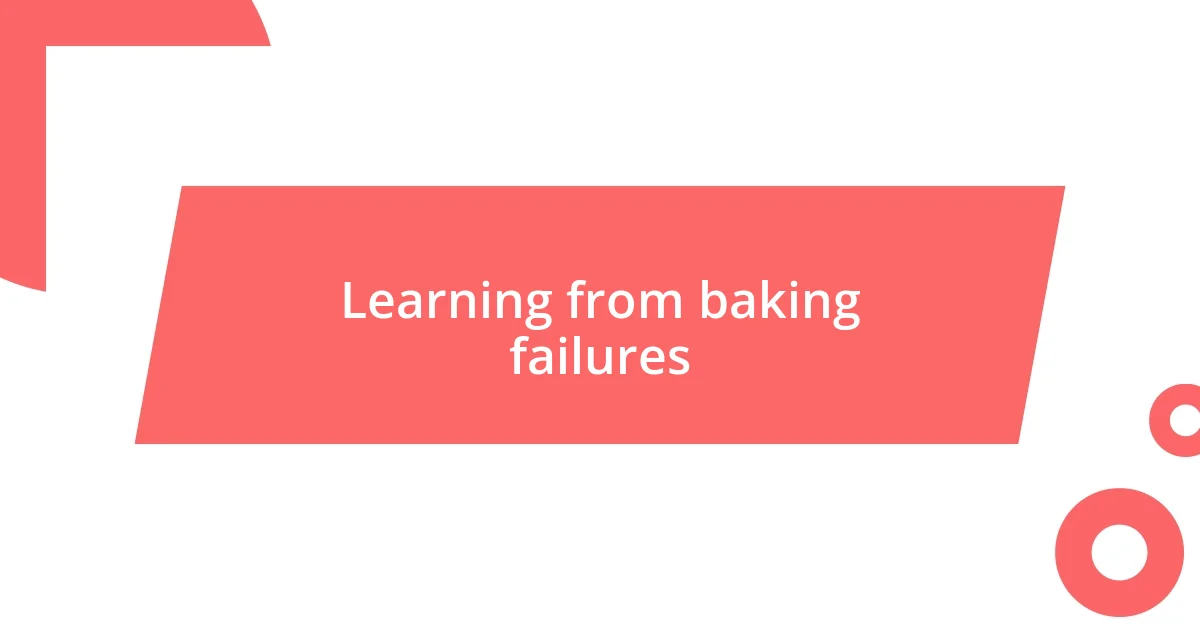
Learning from baking failures
Failure in baking is something I’ve come to embrace, often leading to the biggest lessons. I vividly remember my first attempt at making a souffle; I was so excited until it collapsed like a deflated balloon. At that moment, instead of disappointment, I felt a spark of curiosity. Why did it flop? I dove into research, discovering more about the importance of stable egg whites and right baking temperatures. Who knew a kitchen mishap could turn into an opportunity for growth?
Reflecting on my baking blunders, I realize that each failed recipe was like a stepping stone on my journey. There was that time I forgot to add sugar to a cake mix; it came out as dry as a desert! Yet, instead of discarding it, I transformed it into a trifle by layering it with fruits and whipped cream. This taught me a valuable lesson: mistakes can lead to creativity. Don’t you find it exhilarating when a disaster turns into a delightful surprise?
The emotional rollercoaster of baking failures can be quite enlightening. I used to be incredibly frustrated when my bread didn’t rise, but then I learned to laugh it off. Baking became less about achieving perfection and more about indulging the process. I still fondly reminisce about my overly salty brownies. After that catastrophe, I learned not just the importance of taste but also the joy of sharing my mishaps with friends. It’s these moments of vulnerability that can create genuine connection. Can you think of a time when a kitchen disaster brought laughter instead of tears? I know I can!










